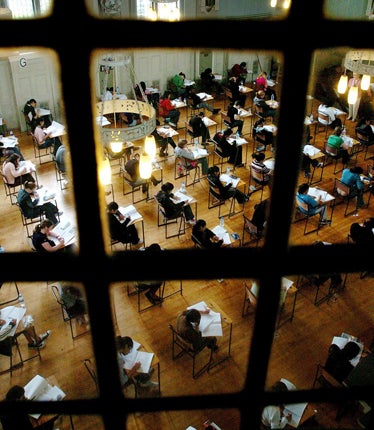'Ban A-level resits to save exams' credibility'
Re-entry 'not a sensible way of assessing students' – government inquiry head

Your support helps us to tell the story
From reproductive rights to climate change to Big Tech, The Independent is on the ground when the story is developing. Whether it's investigating the financials of Elon Musk's pro-Trump PAC or producing our latest documentary, 'The A Word', which shines a light on the American women fighting for reproductive rights, we know how important it is to parse out the facts from the messaging.
At such a critical moment in US history, we need reporters on the ground. Your donation allows us to keep sending journalists to speak to both sides of the story.
The Independent is trusted by Americans across the entire political spectrum. And unlike many other quality news outlets, we choose not to lock Americans out of our reporting and analysis with paywalls. We believe quality journalism should be available to everyone, paid for by those who can afford it.
Your support makes all the difference.Pupils should be barred from resitting their A-levels to give the exam results more credibility, says the head of a government inquiry into testing. Lord Sutherland of Houndwood, also chairman of CIEA, the professional body which represents exam markers and assessors, called for radical changes to the exam. More than 250,000 youngsters expect their results on 20 August.
Lord Sutherland said: "At the moment, there is the capacity for re-entry and re-entry and re-entry, particularly at AS-level. I don't think that is a very sensible way of assessing a student's performance."
At present, any candidates can resit their exams. Research from the Qualifications and Curriculum Authority, the exams watchdog, shows the maximum number of resits by any one pupil to be six. It also showed the percentage of A grades awarded would have fallen from 25.3 per cent to 21.6 if resits had not been allowed.
Lord Sutherland stopped short of demanding a complete ban. "Obviously, you have to have some mechanism whereby people who are ill on the day or disadvantaged for other reasons can apply for a resit. But you have to be very careful with these requests. I can remember a student who claimed his third grandmother had died."
He said introduction of the Cambridge Pre-U exam – favoured by some independent schools who believe it stretches their pupils more than A-levels through less reliance on coursework – was a sign that "all is not right" with A-levels. His call is backed by former chief schools inspector Sir Mike Tomlinson.
But Jerry Jarvis, managing director of Edexcel, said: "Only 47 per cent of people pass their driving test the first time. Should we bar the rest from driving?"
Lord Sutherland said he would also introduce starred questions in every A-level paper for bright pupils seeking an A*-grade pass, when the new grade is introduced next September.
"I think it could be very straightforward," he said. "You could have three or four starred questions and A* candidates could attempt one of these questions. This would be an opportunity to show your paces and test different and wider skills. People needn't opt in for it but if they do they could be eligible for an A*.
"You have to have something for the student who is determined to get to, say, Imperial College to study science. "If you don't opt for it, you could still get an A-grade pass at A-level."
Academics are forecasting the rise in the percentage of youngsters obtaining A-grade passes will continue this year. At present, more than one in four scripts are awarded an A-grade pass.
Britain's most elite universities have said that makes it more difficult for them to select the cream of the talent for their most popular courses, such as law and medicine.
Changes to A-levels are being introduced in time for next summer's exam, with a new A* grade coming in and a pledge that exam boards will ask harder, more open-ended questions, which stretch pupils' creative-thinking skills and power of analysis. But Lord Sutherland's comments are indicative of a feeling among many academics that they may not go far enough.
Lord Sutherland, who was appointed by Ed Balls, the Secretary of State for Schools, to head the inquiry into last summer's national curriculum tests (SATs) fiasco, also backed scrapping the primary-school tests for 11-year-olds, and testing children on arrival at secondary school instead.
The idea has been floated by Michael Gove, the Conservative schools spokesman, as a way to stop teachers having to spend so much time teaching for the tests in the last year of primary school.
Lord Sutherland is also calling for a reform of the teacher-training system to allow more time to be allocated to teach trainees how to assess their pupils. He said there had been evidence that many of the coursework assessments by classroom teachers were "wrong". He added there was a danger this stemmed from the fact that "good teachers like their kids and want them to do well".
The CIEA is introducing a new certificate in assessment for teachers and ultimately wants to have at least one fully trained chartered assessor in every school.
Join our commenting forum
Join thought-provoking conversations, follow other Independent readers and see their replies
Comments